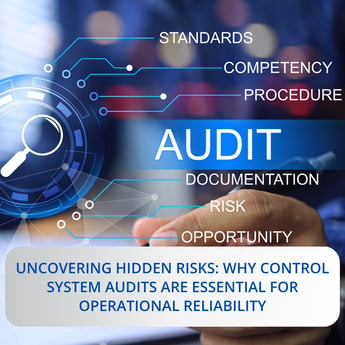In our blog on control system audits and risk analysis, we discussed how to identify and rank the risk factors of installed control systems and how those risks may lead to costly unplanned downtime. Once these risks have been identified, it is important to develop a comprehensive plan to address both the short-term and the long-terms risks. The next step is to take those findings and turn them into a strategic action plan and a modernization plan. A strategic action plan should address any immediate risks identified but needs to be done with an eye on the long-term plan for the organization. Similarly, a long-term modernization plan is more than just a list of planned upgrades – it’s a roadmap to guide your organization through system improvements that are aligned with operational goals, budgetary constraints, and evolving business needs.

Having a strategic plan allows organizations to think beyond quick fixes. Instead of reacting to emergencies or unexpected shutdowns, a long-term strategy enables you to make informed, proactive decisions. Whether you’re dealing with legacy equipment, cybersecurity threats, or preparing for growth, a well-developed plan sets the foundation for sustained success. This plan can offer a range of practical benefits:
- Providing predictable budgeting and cost control: Understanding the costs associated with upgrades and modernization helps you effectively plan for annual CapEx. Knowing what investments are required, and when, will enable better financial control.
- Risk Mitigation and Business Continuity: By addressing the most critical vulnerabilities first, you reduce the likelihood of unplanned outages, safety incidents, and cybersecurity threats. Prioritization ensures that your most pressing issues are resolved before they escalate.
- Alignment with Business Objectives: If your business is planning to expand or shift focus, your modernization plan can account for these goals. Ensuring that upgrades support long-term operational strategy means resources are allocated where they will have the most impact.
- Minimal Disruption to Production: Coordinating upgrades during planned outages allows you to minimize operational disruptions. Strategic scheduling keeps productivity intact while changes are made behind the scenes.
- Optimized Resource Allocation: A phased approach to upgrades helps you plan staffing and support requirements in advance. This ensures you have the right personnel available at the right time throughout the implementation process.
As your modernization plan is guiding your organization through control system upgrades, it is also the perfect time to implement preventative maintenance plans on all your control systems. Whether a system is slated to be upgraded or not, it needs to keep running perfectly to avoid plant downtime. Even a newly upgraded control system can fail because water leaked into the cabinet and went undetected for months, or the cabinet air conditioner broke. Once any system is upgraded, start executing preventative maintenance practices to ensure your system will be running for many years to come.
Another important aspect of a control system modernization plan is to not neglect cybersecurity updates. Keeping firmware and software up to date and patching vulnerabilities are critical to protecting your investments. The more monitoring, verification, and updating you do, the longer you should be able to keep those systems secure and operational.
Applied Control Engineering, Inc. (ACE) has the skills and expertise to be your strategic partner in executing a control system audit, developing a modernization plan, and supporting ongoing maintenance and risk management efforts. For over thirty years, ACE has been working closely with our customers to design, execute, and sustain modernization strategies. Our team collaborates directly with your engineering and production teams to ensure that you are set up for long-term success.
Learn more about how preventative maintenance and control system audits can benefit your operations.


To learn more, visit our Support Services page.
Have questions now? Contact an ACE expert.



